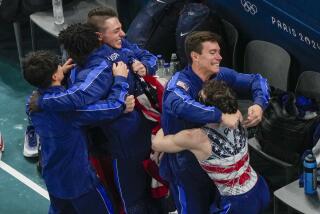Yagudin Deep 6s Field
- Share via
SALT LAKE CITY — He kissed the ice with his tears and his lips, releasing the tension and doubts that had percolated within him for years.
Alexei Yagudin, a son of Russia who left his homeland to refine his remarkable figure skating talents in the United States, straddled the gap between two cultures Thursday with a majestic performance. He earned an Olympic-record four perfect 6.0s for presentation and a gold medal--not to mention the affection of the roaring crowd at the Salt Lake Ice Center.
“I was like in a fog,” he said of his emotions when he saw his scores and realized he had beaten his former rinkmate and still-bitter rival, Evgeni Plushenko. “I don’t remember what happened.... It was like some dream up there.”
Yagudin’s “Man in the Iron Mask” free skating program blended two soaring quadruple jumps and six triples with nimble footwork and showmanship of a born performer. Plushenko, who ended Yagudin’s three-year reign as world champion last March, moved up from fourth after the short program to second with a rendition of “Carmen” that incorporated two quads and six triples.
Timothy Goebel, who moved to El Segundo nearly two years ago to train with coach Frank Carroll, made Olympic history by landing three quads in his “American in Paris” program and finished third, held back only by presentation scores that included two 5.4s and one 5.5. His bronze medal was the first by a male U.S. figure skater since Paul Wylie won a silver medal at the 1992 Albertville Games.
“It’s unbelievable,” said Goebel, who skated fourth in the final group of six. “The waiting is the worst part. It’s easy to go out there and skate.
“People always talk about how they dream about the Olympics, but to be there and be on the podium, I can’t believe it.”
Takeshi Honda of Japan, second after the short program, dropped to fourth. Alexander Abt of Russia, who trains at Lake Arrowhead, finished a creditable fifth.
Six-time U.S. champion Todd Eldredge, ninth after the short program, moved up to sixth in his third and final Olympic appearance. Two-time U.S. champ Michael Weiss, eighth after the short program, moved up a notch to seventh, powered by the first quadruple to loop-triple toe loop-double loop combination jump of his career.
In a welcome change, there was no controversy over the judges’ marks, as there was Monday in the pairs event. Carroll wasn’t happy with those 5.4s, but neither he nor Goebel could quibble with the placements.
“I’m just so excited to be sitting here with a medal around my neck,” Goebel said. “At the Grand Prix Final [where he finished third behind Yagudin and Plushenko] I knew I had the potential to be up here with these two gentlemen.
“I prepared really hard, and it showed.”
Yagudin was graceful in victory, but he was less than gracious toward his old coach, Alexei Mishin.
Yagudin left Mishin four years ago to train in Connecticut with Tatiana Tarasova, convinced Mishin lost faith in him and devoted more attention to Plushenko than to him. They have never healed that rift, and Yagudin seemed to deepen it when he gestured toward Mishin and said, “I hear I’m not such a good skater from that side,” in discussing his old doubts and fears.
Mishin later made peace overtures by saying he was “proud of my two skaters, one current and one former,” but Yagudin promptly grabbed the microphone at the post-event news conference and stomped on that olive branch.
“Four years ago I started to work with Tatiana and nobody believed I could be on the podium again,” said Yagudin, the third Russian man in a row to win Olympic gold and fourth in a row from the former Soviet Union.
“She helped me. The gold medal just belongs to me and Tatiana and the people who are around us.”
The final skater, Yagudin, 21, showed no nervousness in landing a quadruple toe loop-triple toe loop-double loop combination as his first jump. He reeled off another quad and six triples, earning 5.9s across the board for technical merit and five 5.9s to go with his 6.0s for presentation.
“I was really fortunate I had such a nice coach as Tatiana Tarasova, who really changed me,” he said. “I became not just a jumper but an artist on the ice.”
Plushenko and Yagudin never looked at each other during the news conference. Through a translator, Plushenko said he was “very satisfied to get the silver medal. ... I did my personal best, but Alexei gave a splendid performance.”
For once, no arguments there.
More to Read
Go beyond the scoreboard
Get the latest on L.A.'s teams in the daily Sports Report newsletter.
You may occasionally receive promotional content from the Los Angeles Times.








